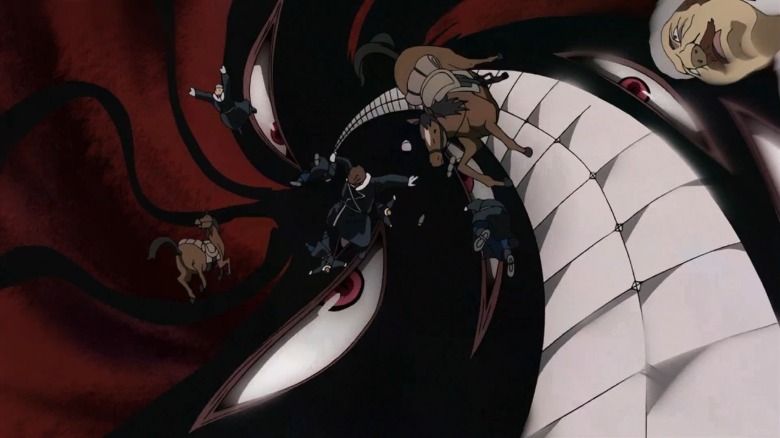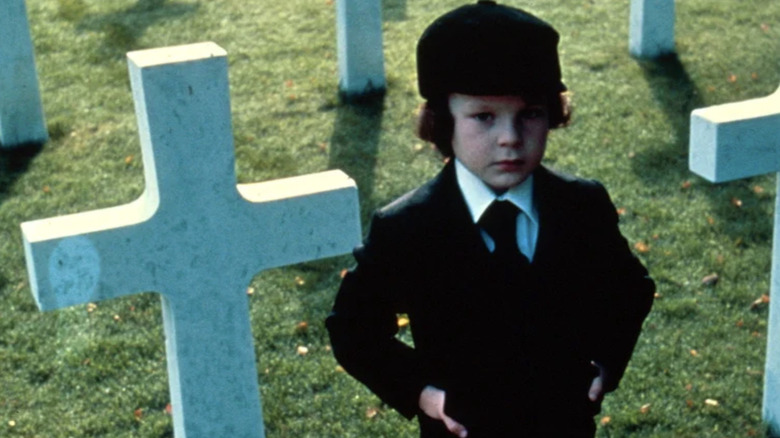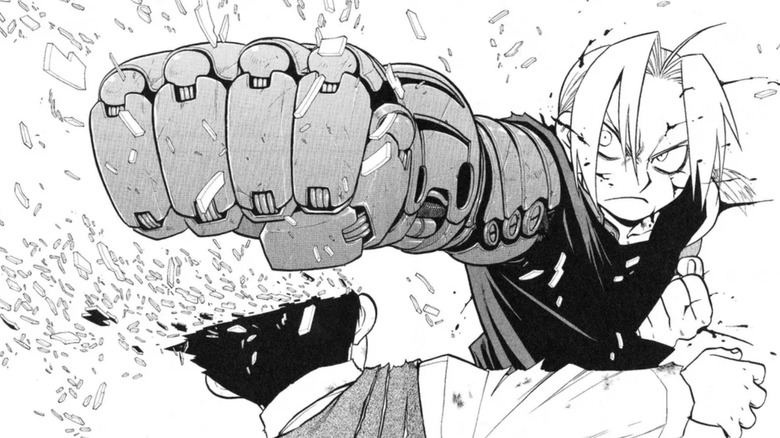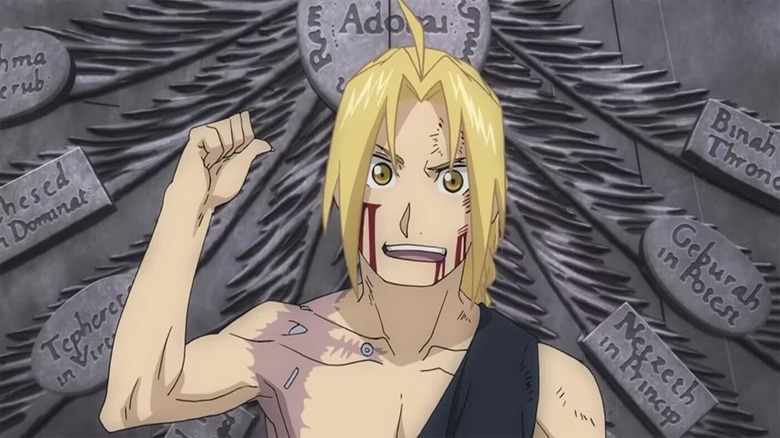The Fullmetal Alchemist Anime Has A Secret Homage To An Ominous Horror Villain
We may receive a commission on purchases made from links.
The rightfully beloved "Fullmetal Alchemist: Brotherhood" anime follows two brothers — Edward and Alphonse Elric — chasing the Philosopher's Stone across the nation of Amestris. Their main obstacle in this task are the Homunculi, artificial humans with names and powers reflecting the seven deadly sins.
The Homunculi's Father wants to use the Elric brothers as "hitobashira" (best translation is "human sacrifice") for his evil plan. Hiromu Arakawa, the Fullmetal author, naming her bad guy "Father," feels influenced by her love for "Star Wars" and Darth Vader. The movie homages in the anime don't end there, including when it comes to Father's pride and joy.
"Fullmetal Alchemist" introduces the Homunculi gradually. The earliest episodes/manga chapters feature only Lust, Gluttony, and Envy. Then, near the end of the series' first cour, it introduces Greed, Sloth, and Wrath. The reveal of Wrath is especially a bombshell: he's actually Führer King Bradley, ruler of Amestris. Bradley's militarism is a cover for Father's plans, and his family (including a wife and an adopted son, Selim) is just part of his cover.
Wrath is not the only homunculus hiding in plain sight. Pride's existence is built up throughout the perfectly paced shonen series. He appears offscreen a few times, talking to his siblings from the shadows. He finally appears in person when the Elrics go to the northern fortress, Briggs. When soldiers are investigating a tunnel underneath Briggs, a shapeless, grinning shadow monster appears to eviscerate them all.
Back in Amestris' capital, Central City, the Elric brothers' friend, Lieutenant Riza Hawkeye (assigned as the Führer's attendant) stumbles on the truth about Pride ... so he steps out of the shadows for her. There's more than one homunculus in the Bradley family, because Selim is really Pride! He may look like a little boy, but that's just his shell. His true form, which can extend without limit, is a mass of razor-sharp teeth and shadows. His only weaknesses are bright light and complete darkness (because shadows can't exist in either).
Selim's nature recalls a different demonic child in disguise: Damien Thorn from the classic horror film (and subsequent franchise), "The Omen."
Pride from Fullmetal Alchemist is a shadow of Damien from The Omen
As /Film's Chris Evangelista has noted, "The Omen" was part of the late '60s-'70s wave of Christian-themed horror films. The trend began in literature; one place to pin the kick-off point is Ray Russell's 1962 novel "The Case Against Satan." Then it spread to film, especially since novels like Ira Levin's "Rosemary's Baby" and William Peter Blatty's "The Exorcist" swiftly became movies. (Insidiously, one can see how these movies spurred the Satanic Panic of the 1980s, but that's a topic for another time.)
"The Omen," which was not based on a book, was a trend follower. Directed by Richard Donner, the movie stars Gregory Peck as diplomat Robert Thorn. After his son is seemingly stillborn, Robert adopts an orphan, passing him off to his wife, Katherine (Lee Remick), as their own biological son, Damien. As Damien (Harvey Spencer Stephens) grows up, strange things happen around him. His nanny dies by suicide, he freaks out on hallowed ground, and a priest named Brennan (Patrick Troughton) tries to convince Thorn that his son is evil. It's gradually revealed that Damien is the Antichrist, born through an evil cult and placed with the Thorns so he will grow up near power; the story of Damien's birth was told firsthand almost 50 years later in the immaculate prequel film, "The First Omen."
At the end, the Thorns are dead, and Damien is adopted by the ambassador's old college buddy: the President of the United States. The movie concludes with Damien smiling at the camera, his mischievous eyes concealing greater evil.
The similarities between Selim and Damien are obvious. (Can you say "Ave Homunculi"?) They even look similar; they're short and wear boys' suits. Selim, too, is the son of the Devil. (Father may resemble the Christian God, but he's the root of all evil in Amestris and lives in a realm beneath Central City, evoking the common conflation of Hell and the underworld.) He's been placed in disguise as the child of a politically powerful family, or a spot perfect to exert his influence; this time, the evil child's stepfather is in on the plot.
Another difference is that while Damien in the original "Omen" does only have the intelligence of a human child, Selim is wearing a mask. He pretends to behave like a kid, but around people who know his true identity, he speaks like the centuries-old being that he is. He's completely aware of what he's doing and, unlike Damien, who unconsciously causes evil, Selim knowingly kills people when they threaten his Father's plans.
But there is a deeper reason that Arakawa makes a character representing Pride have the body of a child. In "Fullmetal Alchemist," Pride is a childish quality meant to be grown out of.
The meaning of Pride in Fullmetal Alchemist, explained
Edward Elric is the "Fullmetal Alchemist" hero who shares the deepest animosity with Pride. Before Selim reveals his true self, he gets on Ed's nerves by making fun of how short he is. When Ed learns the truth, the rivalry goes deeper than mere irritation. In episode 61, "He Who Would Swallow God," Ed is the one who defeats Pride, smashing his Philosopher's Stone core and leaving his human shell to crumble to dust. Pride reforms as an infant, free of his memories and powers. Selim Bradley becomes his true self, a most humiliating fate.
Ed defeating Pride is not exactly the culmination of a long-held rivalry, but it does embody Ed's character arc. At the beginning of the series, Ed and Alphonse (only 11 and 10 years old, respectively) tried to bring their dead mother Trisha back to life with alchemy. Ed was arrogant enough to think that he could break the laws of nature without consequence, and led his brother along on that quest.
Well, surprise, he was wrong; for their sin of "human transmutation," Ed lost his left leg, and Al lost his whole body. To bond Al's soul to a suit of armor, Ed, in turn, sacrificed his right arm.
Even as the titular Fullmetal Alchemist, Ed still thinks alchemy holds all the answers in the universe, and it's only a matter of time before he gets them. He's basically Victor Frankenstein as a shonen hero, which is why I think "Fullmetal Alchemist" the manga deserves to be called one of the best "Frankenstein" comics.
Overcoming Pride in Fullmetal Alchemist
Father's plan, to become God by acquiring all knowledge in the world, is a dark mirror of Ed's early mindset. But Ed slowly grows out of that belief. One of the earliest episodes of "Fullmetal Alchemist: Brotherhood" features the Elrics failing to save Nina, a little girl they became friends with. As they mourn in the rain, Ed shouts in despair:
"We know the truth. We know we're not devils. We know we're not gods. We're human. We're only human! We can't even do anything to save one innocent little girl."
The end of Ed's journey is when he realizes how he can restore Al to his human body — by sacrificing his own ability to perform alchemy. And so that's the sacrifice he makes, without hesitation. As he makes his decision, he echoes his earlier words:
"The only thing I've ever been [is] just a simple human who couldn't save a little girl."
Ed's arc is about overcoming his own pride, so he also defeats the literal embodiment of Pride to complement that arc. Arakawa ties the demise of each homunculus to what their sin represents, and how the character who defeats them represents that sin. For instance, the vigilante Scar, who struggles with anger and his desire for vengeance, is the one who defeats Wrath.
Pride refused to be anything but what he already is: his Father's attack dog. Like any child, he wants his dad to love him. Ed, though, was able to grow and become something more. The series even ends with him embarking on another journey because the world has plenty to offer without alchemy.




